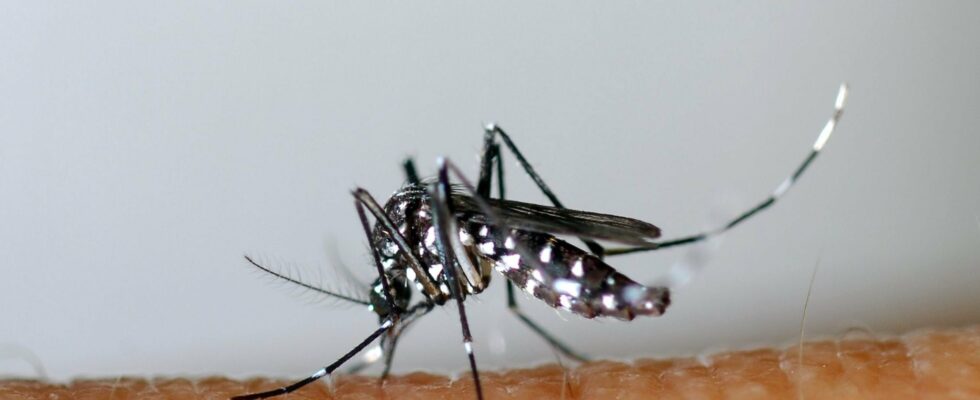Beyond the logistics of the Paris 2024 Olympic Games, the French authorities will face another challenge this summer: protecting people present in Ile-de-France from viruses linked to mosquito bites. It is on this theme that the Pasteur Institute relaysTuesday June 18, a study published mid-May in the medical journal of epidemiology Eurosurveillance.
Carried out by researchers from the Pasteur Institute, the Regional Mosquito Control Agency and the National Reference Center for Arboviruses, this study is based on a simple observation: the mixing of populations in Greater Paris linked to the Olympic Games could multiply the number cases of infections with viruses transmitted by the tiger mosquito, such as dengue or chikungunya. From then on, the researchers precisely evaluated the number of days necessary for this mosquito to transmit these viruses. An important step to better combat the risks of epidemics.
Cases of infections are exploding in mainland France
To fully understand this health threat and the interest of this study, we must return to the mechanism of disease transmission by a mosquito. Indeed, these arthropods can transmit certain viruses from one human to another. These viruses are then called “arboviruses”. As the Pasteur Institute explains, “the transmission of arboviruses occurs when the female bites an individual carrying the virus and ingests viral particles. […] When the female mosquito then bites another human, she will inject the virus at the same time as she sucks up her dose of blood.
This phenomenon is thus found in the tiger mosquito, which can theoretically transmit five viruses: dengue, chikungunya, Zika, Usutu and West Nile. Although these viruses are not usually common in mainland France, more and more people visiting high-risk areas are returning contaminated to French soil. End of April, Public Health France estimated as well as “between January 1 and April 19, 2024, 1,679 cases of imported dengue fever were reported”. Or 13 times more cases than during the same period in 2023.
Likewise, the rapid spread of the tiger mosquito in mainland France since 2004 is causing more and more cases of “native” contamination: the tiger mosquito can bite a person suffering from one of these viruses upon their return to France, then transmit it to someone who has not traveled to a risk area.
3 to 21 days to transmit a virus
And it is precisely this context that worries the researchers of the study published in mid-May. While cases of arbovirus infections linked to tiger mosquitoes are already on the rise, the organization of the Paris Games represents an “additional risk”, specifies the Pasteur Institute: the event combines “a significant mixing of populations with a period returning holidaymakers from endemic areas and a period conducive to the development of mosquitoes”, due to summer temperatures.
To limit these risks of epidemics, the authors of the study therefore sought to measure as precisely as possible the capacities of the tiger mosquito present in Ile-de-France to transmit these five viruses. That is to say, their incubation time: the number of days necessary for the virus ingested by the mosquito to multiply in its body and contaminate the next person bitten.
Results of the study: at a temperature of “28°C, probable in this region at this time”, specifies the Pasteur Institute, “the West Nile virus needs 3 days before being retransmitted by the mosquito; […] between 3 and 7 days for chikungunya virus and Usutu; And […] between 14 and 21 days for dengue and Zika.
Useful data to fight these viruses
Far from seeking to frighten the population, the Pasteur Institute affirms that this data can above all “develop appropriate control strategies” against these contaminations. Thus, “if a case of dengue is detected in Ile-de-France, we now know that disinfestation must take place within 21 days”, explains for example Anna-Bella Failloux, head of the “Arboviruses and insects” unit. vectors” from the Pasteur Institute, which led this study.
This information should also make it possible to improve the surveillance system for cases of viruses transmitted by the tiger mosquito, put in place since 2006 in France to limit the risks of transmission. The Pasteur Institute thus reminds that in the event of a “diagnosis made for one of these diseases, an investigation is carried out by regional health agencies in order to determine the places where these people live [et où elles] have passed the previous days”, in order to define the areas to be disinected.
If the Pasteur Institute judges this alert system to be “effective”, the press release nevertheless specifies preventive actions at the individual level to protect oneself from bites: equip one’s home with mosquito nets, soak oneself in “repellents” and wear “protective clothing”. long”. And this, even in the middle of summer.
